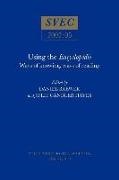Read more
As editors of the
Encyclopédie, Diderot and D'Alembert claimed that one of the work's greatest strengths was that the knowledge it contained was useful. It was indeed, for the
Encyclopédie assembled existing knowledge from a wide range of fields, making that knowledge potentially accessible to a broad readership. In addition, the
Encyclopédie contributed to creating new areas of inquiry and forming new knowledge in vast fields now called science and technology, the arts and humanities. The sheer amount of knowledge contained in the pages of the
Encyclopédie is impressive enough. But what the encyclopedists aimed for was a way to put knowledge to work. What they sought above all was a way to fashion critical knowledge, the kind designed to demystify readers, to 'undeceive them' as Diderot put it, and thus to free them from the reign of superstition, doctrine, and received ideas. The
Encyclopédiedoes aim to advance the Enlightenment project in this fashion. It also contains voices that are hostile or merely indifferent to such a grandiose project. Yet ultimately, the encyclopedists are correct in their claim that the
Encyclopédie provides a stronger, more powerful way of knowing things, one more able to resist or at least to situate critically prior ways of knowing. A century and a half after the appearance of the first volume of the
Encyclopédie in 1751, as we open its pages - or view them on-line or from a CD-Rom -
what the encyclopedists knew is of less importance to us now than
how they knew. Or rather, to understand what the
Encyclopédie presents to its readers in the way of knowledge, we must also consider how that knowledge is to be read. For us today, the most fascinating, compelling, and challenging aspect of this daring, monumental experiment is the way it entwines what the present volume calls ways of knowing and ways of reading. Thanks to the extensive scholarship of literary and cultural historians, we now know more than ever about the
Encyclopédie project, from the socio-intellectual networks to which individual encyclopedists belonged, to the print culture networks through which their work circulated. Building on that contextual knowledge, the present volume returns to the text of the
Encyclopédie in a series of essays that consider, in various ways, the encyclopedic relation to knowledge. The range of topics treated here is broad, corresponding quite naturally to the breadth of the
Encyclopédie itself. But these essays call us to reflect on the twin issues of epistemology and history, exploring the questions, debates, and paradigms in terms of which critical knowledge is produced in the eighteenth century, as well as in our own.

